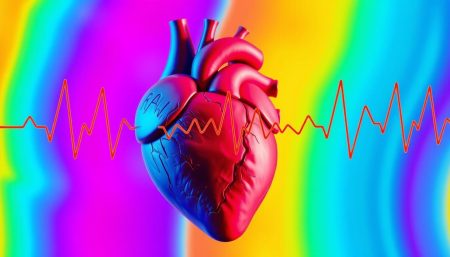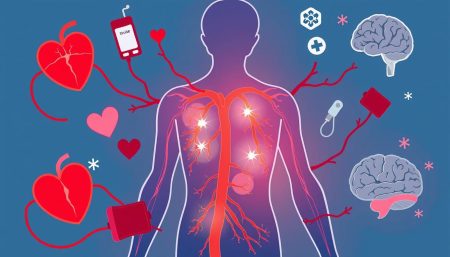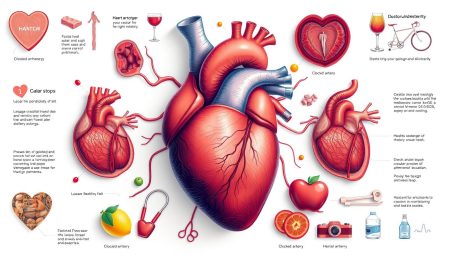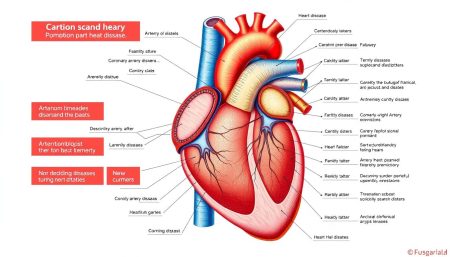Cardiovascular disease is a big health problem around the world. But, the good news is that many cases can be stopped. By eating right, staying active, and making good choices, we can lower our heart disease risk.
This guide will show you how to keep your heart healthy. We’ll look at simple steps you can start today. You’ll see how changing your diet and exercise can greatly improve your heart health.
Are you ready to take care of your heart? Let’s learn how to prevent heart disease and keep your heart healthy for a long time.
Understanding Cardiovascular Disease and Its Risk Factors
Cardiovascular disease is a big health issue affecting millions. It’s important to know its types and risk factors to keep our hearts safe.
Common Types of Cardiovascular Conditions
Heart disease has many forms, each affecting our heart system in different ways. Here are some common ones:
- Coronary artery disease
- Heart valve disease
- Arrhythmias
- Heart failure
Identifying Personal Risk Factors
Knowing your risk factors is the first step to avoiding heart disease. Some risks we can manage, like stress and smoking. Others, like age or family history, we can’t change but should watch closely.
| Modifiable Risk Factors | Non-Modifiable Risk Factors |
|---|---|
| High blood pressure | Age |
| High cholesterol | Gender |
| Smoking | Family history |
| Obesity | Ethnicity |
The Role of Genetics and Family History
Your family history is key to your heart health. If your relatives have had heart issues, you might be at higher risk. While we can’t change our genes, knowing our family history helps us take steps to prevent heart problems.
“Understanding your family history is like having a roadmap for your heart health journey.”
By knowing these factors and working with healthcare providers, we can create plans to keep our hearts healthy and strong.
How Can We Prevent Cardiovascular Disease Through Lifestyle Changes
Preventing heart disease starts with smart choices. Making key changes can lower your risk and improve heart health. Let’s look at ways to protect your heart through daily habits.

Keeping blood pressure in check is vital for heart health. Regular exercise, like brisk walking or swimming, helps manage blood pressure. Aim for 30 minutes of activity most days.
This not only helps with blood pressure but also keeps you at a healthy weight.
Diet is also key in preventing heart disease. Eating fruits, vegetables, whole grains, and lean proteins helps control blood pressure and weight. Limit salt, saturated fats, and added sugars to protect your heart.
“Small changes in your daily routine can make a big difference in your heart health.”
Managing stress is another important part of heart-healthy living. Try relaxation techniques like deep breathing, meditation, or yoga. These can lower blood pressure and improve well-being.
| Lifestyle Change | Benefits for Heart Health |
|---|---|
| Regular Exercise | Lowers blood pressure, helps maintain healthy weight |
| Heart-Healthy Diet | Controls blood pressure, supports weight management |
| Stress Reduction | Decreases blood pressure, improves overall well-being |
By making these lifestyle changes, you can prevent cardiovascular disease. Remember, being consistent is key to maintaining heart health for the long term.
Essential Components of a Heart-Healthy Diet
A healthy diet is key to avoiding heart disease. Making smart food choices can greatly lower heart risk. Let’s look at the main parts of a heart-friendly diet.
Mediterranean Diet Benefits for Heart Health
The Mediterranean diet is great for your heart. It focuses on plants, lean proteins, and healthy fats. Studies show it can cut heart disease risk by up to 30%. Research also suggests it may slow down brain decline, benefiting both your heart and brain.
Foods to Include and Avoid
To keep your heart healthy, eat these foods:
- Fruits and vegetables
- Whole grains
- Lean proteins (fish, poultry)
- Nuts and seeds
- Olive oil
Stay away from these:
- Processed meats
- Sugary drinks
- Saturated and trans fats
- Too much salt
Portion Control and Meal Planning
Controlling portions is vital for a healthy diet. Use smaller plates to gauge serving sizes. Plan meals to ensure balanced nutrition all week. This helps you make heart-healthy choices and avoid eating too much.

| Meal | Heart-Healthy Option | Portion Size |
|---|---|---|
| Breakfast | Oatmeal with berries | 1 cup |
| Lunch | Greek salad with grilled chicken | 2 cups salad, 3 oz chicken |
| Dinner | Baked salmon with quinoa and vegetables | 4 oz salmon, 1/2 cup quinoa, 1 cup veggies |
| Snack | Handful of almonds | 1 oz (about 23 almonds) |
By following these dietary tips, you’re making a big step towards better heart health. Remember, even small changes can make a big difference in your well-being.
Physical Activity and Exercise Guidelines for Heart Health
Regular exercise is key to a healthy heart. It’s important to mix cardio and strength training. This helps a lot with heart health. Let’s look at some good ways to start your heart-healthy fitness journey.
Cardio Exercise Recommendations
Cardio is vital for a strong heart and better blood flow. You should do at least 150 minutes of moderate cardio or 75 minutes of vigorous cardio each week. Good cardio activities include brisk walking, jogging, swimming, or cycling.

Strength Training Benefits
Strength training is great for building muscle and boosting metabolism. Do strength exercises at least twice a week. Focus on all major muscle groups. You can use bodyweight, free weights, or resistance bands.
Creating a Sustainable Exercise Routine
To keep exercising, start small and slowly get more intense and longer. Mix up your workouts to stay interested. Set goals you can reach. Always listen to your body and talk to your doctor before starting new exercises.
| Exercise Type | Frequency | Duration | Examples |
|---|---|---|---|
| Cardio Exercise | 5 days/week | 30 minutes/day | Brisk walking, swimming, cycling |
| Strength Training | 2-3 days/week | 20-30 minutes/session | Push-ups, squats, lunges |
| Flexibility | Daily | 5-10 minutes | Stretching, yoga |
By following these tips and making exercise a regular part of your life, you can greatly improve your heart health and overall well-being.
Managing Stress and Mental Health for Better Heart Function
Stress and mental health are key to a healthy heart. Stress makes our bodies release hormones that can raise blood pressure and heart rate. This can cause heart problems over time.

- Deep breathing exercises
- Meditation or mindfulness practices
- Regular physical activity
- Adequate sleep
- Spending time in nature
Mental health issues like depression and anxiety can harm the heart. People with these conditions face a higher risk of heart disease. It’s vital to seek help for mental health to keep your heart healthy.
“Taking care of your mental health is just as important as managing your physical health when it comes to heart function.”
Here’s how managing stress and mental health can help your heart:
| Aspect | Impact on Heart Function |
|---|---|
| Stress Reduction | Lowers blood pressure and heart rate |
| Improved Mental Health | Reduces inflammation and risk of heart disease |
| Regular Exercise | Strengthens heart muscle and improves circulation |
| Quality Sleep | Allows heart to rest and repair |
By focusing on stress management and mental health, you can greatly improve your heart function. This leads to better overall heart health.
The Impact of Smoking Cessation on Heart Health
Smoking harms the heart a lot. Quitting is key to better heart health. The good effects start right away and keep getting better.
Timeline of Heart Recovery After Quitting
The heart starts healing quickly after the last cigarette. Here’s a quick look at heart recovery:
- 20 minutes: Heart rate and blood pressure drop
- 12 hours: Carbon monoxide levels in blood return to normal
- 1-9 months: Coughing and shortness of breath decrease
- 1 year: Risk of coronary heart disease is cut in half
- 5 years: Stroke risk reduces to that of a non-smoker
Strategies for Successfully Quitting Smoking
Quitting smoking is tough, but it’s doable with the right plan. Here are some effective ways to quit:
- Set a quit date and stick to it
- Use nicotine replacement therapy
- Join a support group or seek counseling
- Practice stress-reduction techniques
- Exercise regularly to manage cravings
Quitting smoking is a journey. Every try gets you closer to success. Your heart will be grateful for every step towards a smoke-free life. Understanding the link between heart health and brain can motivate you more to quit smoking.
“Quitting smoking is the single best thing you can do for your heart health.” – American Heart Association
Blood Pressure Management and Monitoring
Keeping your blood pressure in check is vital for heart health. Learning how to manage and monitor it lets you take control of your heart’s well-being.
Natural Ways to Lower Blood Pressure
There are many natural ways to keep your blood pressure in check. Regular exercise, like brisk walking or swimming, can help. Also, eating less salt and more fruits, vegetables, and whole grains is beneficial.

Stress management, like meditation or yoga, can also help. Getting enough sleep and drinking less alcohol are other natural ways to keep your blood pressure healthy.
Home Monitoring Tips and Tools
Tracking your blood pressure at home is a great way to stay on top of it. Here are some tips for accurate readings:
- Measure at the same time each day
- Avoid caffeine and exercise 30 minutes before measuring
- Sit quietly for 5 minutes before taking a reading
- Use a properly sized cuff for your arm
Digital blood pressure monitors are easy to use and give quick results. Some even connect to apps on your smartphone for tracking. Always bring your monitor to your doctor’s appointments to check its accuracy.
“Regular home monitoring empowers patients to take an active role in managing their blood pressure,” says Dr. Sarah Johnson, a cardiologist at Heart Health Center.
By using natural methods to lower blood pressure and regular home monitoring, you can manage your heart health well. This reduces the risk of heart problems.
Maintaining a Healthy Weight for Heart Protection
Keeping a healthy weight is key for heart health. Extra pounds can put a lot of strain on your heart. This increases the risk of heart problems. By focusing on a healthy weight, you’re taking a big step towards better health.
Knowing your body mass index (BMI) is important. A BMI between 18.5 and 24.9 is healthy. If you’re above this, don’t worry. Small, steady changes can greatly improve your heart health.
“Losing just 5-10% of your body weight can significantly improve heart health.”
Here are some practical tips for weight management and heart protection:
- Eat a balanced diet rich in fruits, vegetables, and whole grains
- Control portion sizes to avoid overeating
- Stay hydrated with water instead of sugary drinks
- Engage in regular physical activity, aiming for 150 minutes per week
- Get enough sleep, as lack of rest can lead to weight gain
Remember, maintaining a healthy weight isn’t about quick fixes. It’s about making lasting lifestyle changes. By focusing on weight management, you’re actively preventing obesity and protecting your heart for the future.
Regular Health Screenings and Medical Check-ups
Keeping your heart healthy is very important. Regular check-ups can find problems early. This helps keep your heart in top shape. Let’s look at the main parts of heart health checks.
Essential Heart Health Tests
Heart health tests are key to stopping heart disease. These include:
- Blood pressure measurements
- Cholesterol level checks
- Blood glucose screening
- Body mass index (BMI) calculation
Your doctor might suggest more tests based on your risk and family history.
Understanding Your Numbers
Knowing your test results is just the beginning. It’s important to understand what they mean. This helps you take care of your heart. Here’s a quick guide:
| Test | Healthy Range |
|---|---|
| Blood Pressure | Less than 120/80 mm Hg |
| Total Cholesterol | Less than 200 mg/dL |
| Fasting Blood Sugar | Less than 100 mg/dL |
When to See a Cardiologist
While your regular doctor can handle basic heart tests, some cases need a cardiologist. You should see a heart specialist if you:
- Have a family history of heart disease
- Experience chest pain or shortness of breath
- Have high blood pressure that’s hard to control
- Are diabetic or have high cholesterol
Prevention is the best approach. Don’t wait for symptoms to see your heart health. Make sure to schedule those check-ups and stay heart-healthy!
Natural Supplements and Alternative Approaches for Heart Health
Many people look to natural supplements and alternative methods to boost their heart health. These options shouldn’t replace medical advice but can add to it. Some natural supplements for heart health have shown promise in studies.
Omega-3 fatty acids, found in fish oil, are known for their heart benefits. They may help lower blood pressure and reduce inflammation. Coenzyme Q10 is also gaining attention for its heart function improvement. Some people use garlic in their diet or as supplements to manage cholesterol.
Meditation and yoga are also seen as beneficial for heart health. They help reduce stress, a major risk factor for heart disease. Acupuncture is another option some people use to manage heart symptoms. While research is ongoing, many find these methods helpful in a holistic heart care approach.
It’s important to talk to your doctor before starting any new supplements or treatments. They can help you understand the benefits and risks. This ensures these approaches are safe and work well with your current heart health plan.
FAQ
Q: What are the most effective lifestyle changes for preventing cardiovascular disease?
A: To prevent cardiovascular disease, eat healthy, exercise regularly, and manage stress. Quit smoking and control your blood pressure. Also, keep a healthy weight. These steps can greatly lower your risk.
Q: How does family history affect my risk of cardiovascular disease?
A: Family history is key in heart disease risk. Early heart disease in relatives increases your risk. But, a heart-healthy lifestyle can reduce genetic risks.
Q: What is the Mediterranean diet, and how does it benefit heart health?
A: The Mediterranean diet focuses on fruits, veggies, whole grains, lean proteins, and olive oil. It lowers cholesterol, improves blood sugar, and reduces inflammation. This diet is great for heart health.
Q: How much exercise is recommended for maintaining good heart health?
A: Aim for 150 minutes of moderate aerobic activity weekly. Or, do 75 minutes of vigorous activity. Include muscle-strengthening activities two days a week. Activities like walking, swimming, or cycling are good.
Q: How can I effectively manage stress to protect my heart?
A: Manage stress with exercise, meditation, and deep breathing. Yoga, social connections, and hobbies also help. Prioritize sleep and seek help if stress is too much.
Q: How long after quitting smoking does heart health improve?
A: Quitting smoking improves heart health quickly. Your heart rate drops in 20 minutes. Carbon monoxide levels normalize in 12 hours. Within 5 years, your stroke risk is like a non-smoker’s.
Q: What are some natural ways to lower blood pressure?
A: Lower blood pressure by eating less sodium and more potassium. Exercise regularly and limit alcohol. Manage stress and maintain a healthy weight. Meditation and deep breathing can also help.
Q: How often should I have my heart health checked?
A: Adults over 20 with no risk factors should get a cholesterol test every 4-6 years. Check blood pressure every 2 years. More frequent tests are needed with risk factors or family history.
Q: When should I consider seeing a cardiologist?
A: See a cardiologist for chest pain, shortness of breath, or irregular heartbeats. If you have risk factors or a family history, a cardiologist can assess your risk and create a prevention plan.
Q: Are there any natural supplements that can help prevent cardiovascular disease?
A: Some supplements like omega-3 fatty acids, coenzyme Q10, and plant sterols support heart health. But, talk to a healthcare provider before starting any supplements. They can interact with medications or have side effects.


















